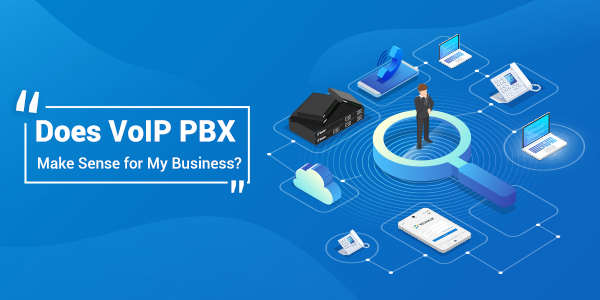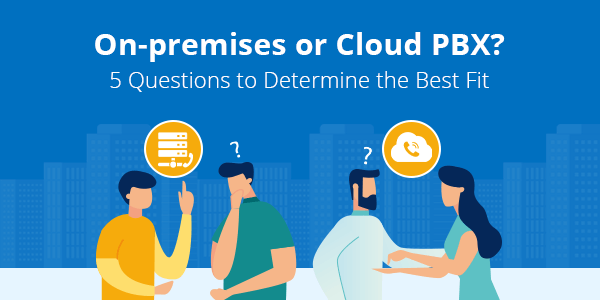The current COVID-19 pandemic is shifting the way businesses work. Many companies have adopted remote working practices under social distancing. The transformation requires the corresponding adaption in tools and technology they operate with every day, bringing up unprecedented challenges for some organizations which have no experience in teleworking before.
When it comes to working from home, communications is the key to keep business as usual. However, those who rely on legacy phone systems and physical phone lines find it difficult to set up a remote working environment for their employees because their communications systems are inherently incapable of completing this task. With complimentary offers provided by some VoIP and UC service providers and vendors, many businesses have taken temporary measures to handle the situation.
While the pandemic prompted the transition, remote working might be here to stay after COVID-19. It requires serious consideration for traditional PBX users to plan a system upgrade to VoIP for the future. We understand that some of you might have been using legacy phone systems for quite a long time and are not sure whether a VoIP PBX makes sense for your businesses. We hope this blog post clears your doubts.
1. “What are the differences between VoIP PBX and legacy phone systems?”
With VoIP, voice data travels through internet connections instead of plugging in traditional phone lines. That’s why you need to make sure of the quality of your network before implementing a VoIP PBX system. Though ISDN and PSTN network has proven to be resilient, it has significant limitations in terms of functionality, flexibility, and scalability. Many businesses who used to believe their existing legacy phone systems worked fine, have found it difficult to support remote working recently. What’s more, with the PSTN and ISDN switch-off underway, the clock is ticking for more legacy phone system users to consider IP-based solutions to future-proof their business communications.
2. “What additional benefits can VoIP bring to my business?”
In terms of functionality, VoIP PBX is way ahead of legacy phone systems. Regardless of the business size, VoIP PBX users enjoy enhanced communications features that would previously only be found in an enterprise-level traditional PBX. Some VoIP vendors include unified communications capabilities, such as chat, presence, and CRM integration, in their offering, making a wealth of communications channels into a single point of access. Besides, VoIP is an emergency-proof solution allowing you to ensure business continuity through personal mobile phone connections or alternate internet connections while it may take several hours and even days to fix the problem when a traditional phone service goes down.
3. “What equipment is required to use VoIP? What about my current investments?”
When it comes to VoIP, there is a minimal amount of hardware required to get started. Besides some IP PBXs deployed as the office phone systems without any analog lines, you can also migrate to VoIP without compromising existing equipment investments. Even if you are not ready for a wholesale infrastructure change or have a limited budget on a complete replacement, it is a good option to take a phased transition where you upgrade business communications to IP-based technology and have the traditional PBX integrated into it via VoIP gateways and analog telephone adapters.
4. “Can I keep my existing phone number while using VoIP?”
A phone number is an identity for a business. One of the most common concerns many companies have when switching to VoIP is whether they can keep their existing landline number. Fortunately, most internet telephony service providers in the market have the capability to port numbers with only a few exceptions. Though different countries have their own processes and porting requirements, normally, to move your phone numbers, you may need to reach out to the VoIP service provider about your port request and let your current landline provider know your plan.
5. “I don’t run a big business. Is VoIP right for me?”
VoIP deployment makes good sense for small and medium-sized businesses. One of the primary reasons is cost reduction because VoIP services cost just a fraction of an analog system considering the minimum equipment, eliminated internal calling fees, and reduced cost for long-distance calls. Cloud PBX is the other viable option for SMEs which requires no on-site equipment and installation. The service can be activated and you have a cloud-based phone system up and running within a day.
6. “Does it take a lot of effort for my IT staff to manage a VoIP phone system?”
Comparing to the legacy system, VoIP PBX is a lot easier to install and use, even if you are not particularly tech-savvy. With VoIP, your IT administrator can manage the corporate phone system from a web-based interface. It only takes a few clicks to complete many configurations such as adding extension numbers, setting up ring strategies, monitor the status of extensions, trunks, concurrent calls, and conferences, etc. A cloud-based solution also makes it extremely easy to add new users as the business demands grow.
7. “How to make sure it is well received by my employees?”
The IP-based phone system is very user-friendly. One of the biggest advantages VoIP brings to your employees, especially those who work remotely or are constantly on the go, is that it allows them to stay connected anywhere anytime. Most VoIP providers offer softphones to transform your mobile phone and desktop into office extensions so that you make and receive business calls with any device you prefer. So, instead of working 9 to 5, your employees can embrace greater agility outside of traditional business hours and locations and achieve a better work-life balance.
While adopting VoIP to address remote working needs at the moment, it is also a good chance to evaluate VoIP phone systems in the real world to see if it meets your daily business communications needs and plan for the upgrade when back to the office.





